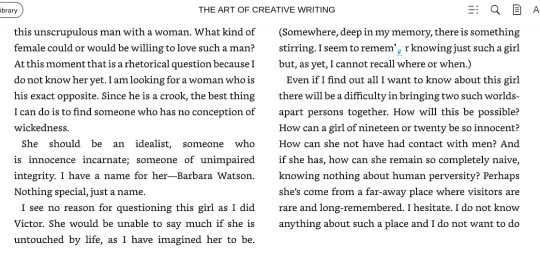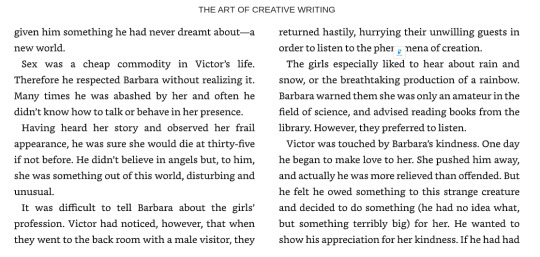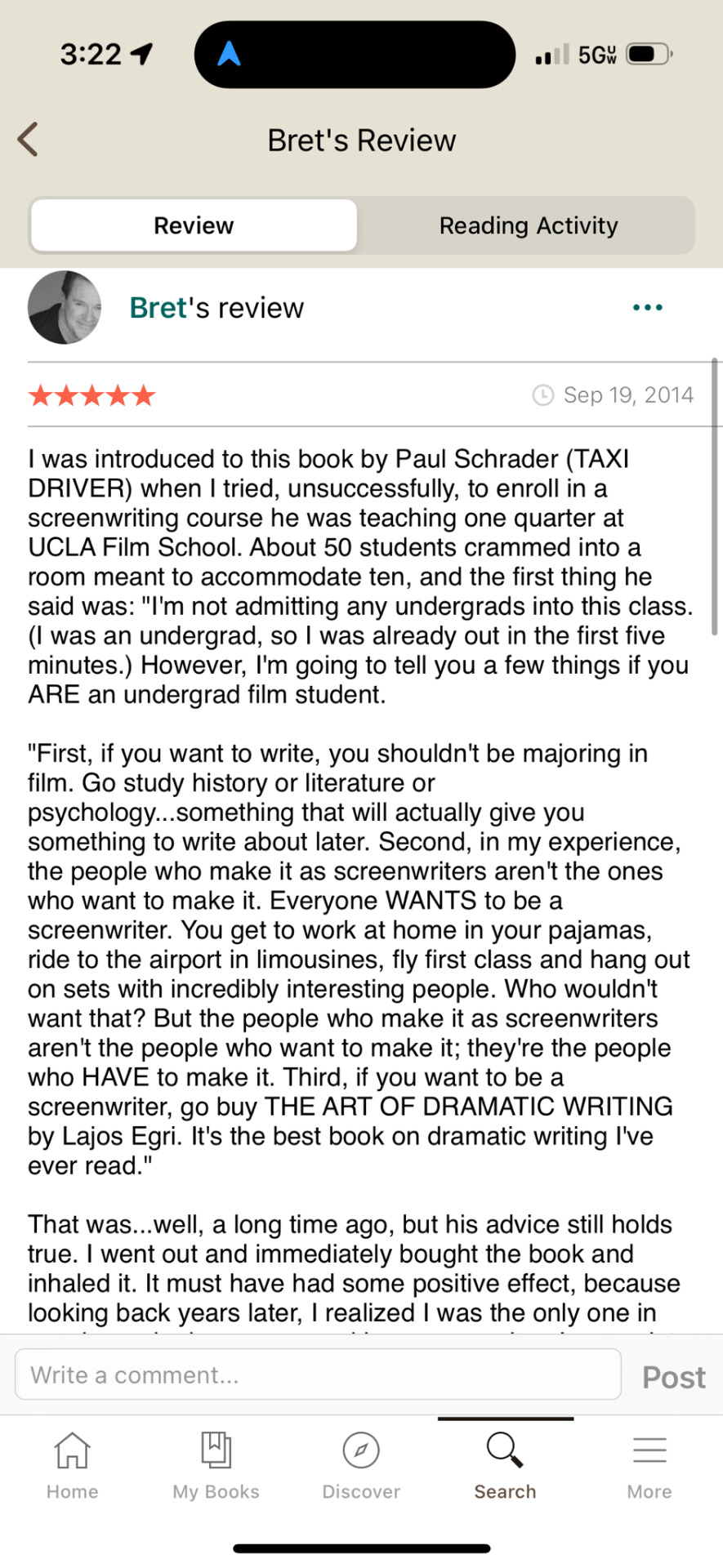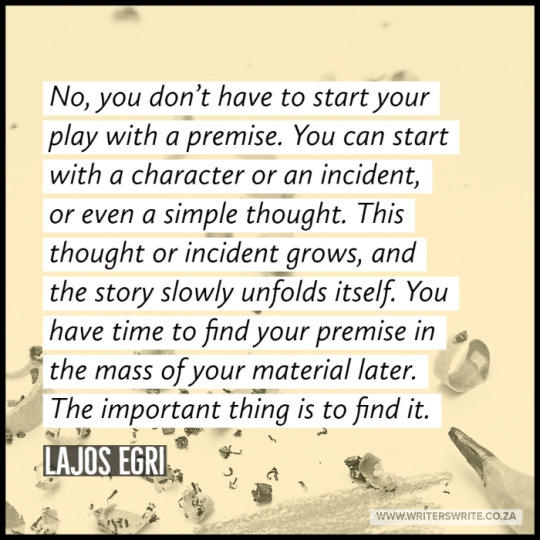#Lajos Egri
Photo


Robert Brownjohn, Ivan Chermayeff, Tom Geismar, Artist's proof for the cover of 'The Art of Dramatic Writing' by Lajos Egri, ca. 1960 [MoMA, New York, NY. © Eliza Brownjohn]
#graphic design#typography#book#cover#book cover#robert brownjohn#ivan chermayeff#tom geismar#lajos egri#simon and schuster#moma#the museum of modern art#1960s
65 notes
·
View notes
Photo

Quotable – Lajos Egri
Find out more about the author here
33 notes
·
View notes
Text
The Art of Creative Writing by Lajos Egri (1965)
!@#$ Lajos Egri again, being creepy. First it was Child marriage and then it's this.
Almost immediately goes into creepy...
TW: sexual assault made "romantic"


... So this part is filled with back story of "How innocent Barbara was" And how Victor was a creep for not reading, or whatever, and how Victor saw girls as a commodity to sleep with.

Yep. And then sexual assault.

And then she's like, you know what, you almost tried to r* me without checking in first, that's sooo romantic. I'll let you do me after that.
This, BTW, is the end of it. OMG, so romantic /sarcasm. Welp, this explains how he ended up with his child bride.
I'll edit this later, to do a deeper analysis, but I needed to shout this out in case people want to borrow this book from the library or worse, buy it. He's not alive, but do you really want to add this book to your collection?
#More creepy Lajos Egri#Lajos Egri#writing manuals#The art of creative writing#this is weird writing advice#Can people stop saying books like this with whammies like this are great writing advice?#Romance needs consent#Romance doesn't need conflict
0 notes
Text

A really good Goodreads review of THE ART OF DRAMATIC WRITING by Lajos Egri.
I passed a guy with this book on the street in the Haight of SF yesterday. I own the same version but haven’t read it. I think i got it around 8 years ago in Ventura at a thrift shop.
He called out to me and asked if I wanted to sit with him and have a beer.
“You buying?” I asked.
He said he didn’t have much money- a slight annoyance to me. But I commented on the book anyways.
He was writing a screenplay. I asked what it was about and he said it was a twisted romance. I told him my book was getting published. He asked what it was about. I said the same thing. We laughed.
I had to get back to hustling but he said he’d wait and then I came back and had to leave for an improv jam. He stood up to say good bye and he was tall which made up for the lack of money.
I hope he texts me. I’m also glad he hasn’t texted me right away. Maybe he knows something about women.
#Goodreads#books#art of dramatic writing#lajos egri#write#writer#writing#literature#paul schrader#taxi#screenwriting
0 notes
Text


The Art of Dramatic Writing, Lajos Egri (1946/1960)
11 notes
·
View notes
Text
Két fontos ellenzéki eredmény 2023-ban
Kicsit hátrébb lépve és egy nagy levegőt véve két idei történést emelnék ki nagy óvatossággal.
Az egyik a jászberényi kétharmados ellenzéki győzelem egy januári időközin, a másik pedig az egri aláírásgyűjtés sikere egy elkerülő út kapcsán.
Mindkettő olyan helyi ügy, amit nem tudott a rezsim átkeretezni, mindkettő mögött komoly munka és szervezettség van.
A jászberényi ellenzéki polgármester úgy erősödött meg, hogy abban egy évtizedes politikai munka áll. Az egri sikerhez pedig kellett az, hogy a Momentum mögött vannak hús-vér aktivisták, akik (a frontpolitikusok mellett) szabadidejükből egy-két hétvégét vagy akár több napot is erre áldoztak. (A DK egyik kampányban sem vett részt, de ez tényleg csak a jegyzőkönyv kedvéért legyen meg.)
Ha nincs elég orvos, ápoló és megfelelő felszereltség Sátoraljaújhelyen, ha a betegeket taxiztatják, várakoztatják, az látszik helyben, annak híre megy. Ha egy város szimbólumát, mondjuk az edelényi kastélyt bezárják a látogatók elől, annak szintén van hírértéke helyben. A Földes Gimnázium nevét sem sikerült sohasem megváltoztatni Miskolcon, mert annak is szimbolikus ereje van a környéken.
Ezzel szemben a pedagógusok ügyét tudatosan és sikeresen tolja be a rezsim a Brüsszellel való csatározás keretébe, pedig mindenkinek a legszemélyesebb helyi ügye az, hogy van-e elég bölcsőde, óvoda és hogy milyen oktatásra számíthat később a gyerek (és a szülő). Pintér bosszútörvényének tehát ők a valódi áldozatai a pedagógusok mellett (lásd erről a tegnapi posztom).
Holott a Fidesz csatája Brüsszellel és a Nyugattal egy nyomorult troll vergődése. A harmadik világháborúval való riogatás is csak arról szól, hogy ne a fentebb leírtakra figyeljen a választó. Lásd ehhez Krekó Péter írását.

Az egri aláírások leadása. Kép forrása: Lőcsei Lajos
3 notes
·
View notes
Link
A Momentum Mozgalom országgyűlési képviselője, Lőcsei Lajos még április elején közölte, hogy feljelentést tesz az egri Lenkey-ház sokszorosan túlárazott
0 notes
Text
Egris pfiffiger Autorenratgeber

Autorenratgeber gibt es viele. Lajos Egri aber ist einzigartig, er hat das wenig bekannte Standardwerk geschrieben – vor 64 Jahren. Eine Schreibschule des besonderen Art. Egris pfiffiger Autorenratgeber macht Spaß.
Wir machen jetzt einen Umweg – und besser zum Ziel zu gelangen. Wenn Sie schreiben wollen, ob Pressemitteilung oder Autobiografie, sollten Sie sich mit den Grundlagen des Schreibens beschäftigen. Lajos Egri hat den besten geschrieben. Und bitte lassen Sie sich nicht irre machen – Egri schreibt für Leute, die Theaterstücke verfasse wollen. Die regeln hier gelten auch für das sonstige Scheiben.
Also los. Aber zuerst: Wer zum Kuckuck ist Lajos Egri?, werden Sie fragen. Lajos Egri, um genau zu sein. Der gebürtige Ungar (1888–1967) hat das Kunststück fertig gebracht, den besten Autorenratgeber weit und breit zu schreiben und dennoch hierzulande ziemlich unbekannt zu sein.
Er ist, wenn man so will, das verkannteste Genie des Creative-Writing-Circus. Der findet vornehmlich in den USA statt, und dort war Lajos Egri (neben Stationen in Europa) auch als Theaterautor und Regisseur tätig. Wie man sein praktisches Wissen theoretisch vermittelt, lehrte er als Direktor der Egri School of Writing in New York.
Geballtes Wissen
Mit seinem Buch „Dramatisches Schreiben“ zeigt er die entscheidenden Kniffe für Autoren, die sich auf die Genre Theater, Film oder Roman einlassen wollen – und nicht nur für sie. Egris pfiffiger Autorenratgeber vermittelt auf 345 Seiten geballtes Wissen – und ist doch selten auf einer der einschlägigen Listen der Ratgeber-Literatur zu finden. Vielleicht liegt es daran, dass es schon 1946 erschienen ist – und fast alle Autoren, die danach Ratgeber verfassten, von Egri abgeschrieben haben. So hat sich James N. Frey, der Egris Buch als „Standardwerk“ lobt, munter der Prämisse bedient, die Egri erfunden hat.
Klar verständliche Schreibschule
Wer das bei Frey aber nie so ganz verstanden hat – bei Egri wird es einem mühelos klar. Denn der ungarischstämmige Theaterspezialist erklärt besser, vertieft konsequent und bringt so lange Beispiele, bis es jeder gefressen hat. Wichtig dabei sind auch die vielen praktischen Tipps. Eine Schreibschule der besonderen Art.
Bis zum Ende komponieren
Nehmen wir besagte Prämisse. Ohne die, so Egri, geht es nicht. Niemand kann auch nur die kleinste Kurzgeschichte ohne eine Prämisse schreiben – denn sie ist der Zweck des Textes, seine „Moral“. Manche sagen auch "Botschaft". Also genau das, worum es in dem Text überhaupt geht und was der Autor und seine Figuren beweisen wollen.
Werden wir konkret: Ein Beispiel könnte sein, skrupelloser Ehrgeiz führt zur eigenen Vernichtung, wie in Shakespeares Macbeth. Danach richtet sich alles aus – die Personen und deren Konflikt. Bis am Ende die Prämisse bewiesen ist. Macbeth geht in seinem skrupellosen Ehrgeiz über Leichen – und stirbt am Ende selbst durch das Schwert.
Schlamper oder nicht
Egri analysiert wichtige Theaterstücke auf die Prämisse hin und zeigt, ob sie eine haben und ob sich alles danach ausrichtet – oder eben nicht. Damit arbeitet er sehr praxisnah; und der ambitionierte Autor lernt nebenbei, dass selbst bekannte Stückeschreiber mit so mancher Prämisse geschlampt haben.
Das merkt man, die Stücke sind seltsam diffus. Denn der Prämisse, das verlangt Egri, muss sich alles unterordnen. Jede Szene, jeder Satz, jede Handlung muss zeigen, dass die Prämisse stimmt. Eine echte Diktatorin ist sie. Natürlich muss dazu auch der Autor an sie glauben. Und die Personen müssen so viel Kraft und Charakter haben, die Prämisse in dem Text zu leben und durch das Stück/den Roman zu tragen. Wer das beherzigt, schreibt spannend und kraftvoll, zeigt Egri. Und was folgt daraus? Egris pfiffiger Autorenratgeber empfiehlt sich wärmstens zur Lektüre.
Die Moral von der Geschichte
Mancher wird jetzt einwenden: Zweck? Moral? Was soll das? Ich schreibe, also bin ich, und meine Texte stehen für sich selbst. Sollen sie – meistens stehen sie dann aber sehr alleine da.
Gute Prämisse
Aus einer gut durchkomponierten Prämisse ergibt sich, laut Egri, alles andere wie von selbst. Allerdings muss der Autor stimmige und detailgetreue Personen entwerfen – und auch hier zeigt Egri sehr konkret, wie das geht. Und aus den Charakteren entwickeln sich die Konflikte, indem man Schlüsselfigur und Gegenspieler ein Ziel gibt, das sie unbedingt (und gegeneinander) wollen. In dem Buch lernt man, wie der Konflikt orchestriert wird und wie man Spannung bis zum Schluss aufbaut und wann der geeignete Angriffspunkt ist, der Text also entscheidend an Fahrt gewinnt.
Egris pfiffiger Autorenratgeber hilft
Mit Egri wird alles stimmig – wie schön, dass der Autorenhaus Verlag dieses Standardwerk seit 2003 in seinem Programm hat. Es ersetzt eine Menge anderer Schmöker zum Thema. Für alle, die eine perfekte Schreibschule suchen ist Egris pfiffiger Autorenratgeber genau die richtige Lektüre.
Lajos Egri: Dramatisches Schreiben, Theater – Film – Roman. Das "Standardwerk". Deutsch von Kerstin Winter. Autorenhaus Verlag 2003, 345 Seiten, ISBN 3-932909-58-5, Euro 19,90.
Mehr dazu: Service für Autoren
Read the full article
1 note
·
View note
Text







I love buying a used book and seeing comments or underlines and circles from a previous owner, it gives me a glimpse into what they thought was important about it.
Here's some examples from a copy of The Art of Dramatic Writing by Lajos Egri that I bought.
#idk if anyone else is as fascinated by this sorta thing as I am#but it's so neat to me#books#writing
1 note
·
View note
Text
Ninth workshop:
COLLAPSE, FIELD, LOCALITY, CAUSALITY: TOPICS IN THE FOUNDATIONS OF QUANTUM THEORY
Venue: Institute of Philosophy, Research Center for the Humanities, Budapest, 1097 Tóth Kálmán u. 4, Floor 7, Seminar room (B.7.16)
Date: November 9, 2023
Organizer: Philosophy of Physics Research Group, Institute of Philosophy
Contact: Gábor Hofer-Szabó and Péter Vecsernyés
The language of the workshop is Hungarian.
The slides of the talks can be found here.
Program:
10.20: Welcome and introduction
10.30: Lajos Diósi: Will quantum theory be different in the macro-world?
Quantum theory was invented for the microscopic world, and proved accurate there. Is it valid in the macroscopic world as well? Is quantum theory universal from particle physics to cosmology? We might like to think so. Except that the experimental evidences are lacking, the relevant theories limp along, and there are crippling conceptual problems. It is therefore not impossible that quantum theory will be different when it reaches the macro-world. But how different will it be?
In quantum theory, the micro-world only affects the macro-world when a measurement is made on the micro-world. Wouldn't there exist certain spontaneous measurements, acting universally everywhere and everytime, negligibly weak in the micro-world and amplified in the macro-world? What does such a theory of spontaneous measurement (i.e., spontaneous wavefunction collapse) look like and what is it good for?
11.30: Coffee
11.45: András László: On the equation of motion of quantum field theory
In the established theories of physics, the central piece of information for the presentation of the theory is an equation of motion, selecting the realizable processes from a wide set of imaginable processes. In the usual formulations of quantum field theory (QFT), however, the presentation is usually very different: the formulation is usually not very concise. In this talk, we come up with a proposal for a concise presentation of QFT, based on a kind of equation of motion. Basically, it is a rigorous formulation, substituting the usual informal Feynman path integral formulation along with the Wilsonian renormalization group equations. At the end, the equation distinguishes a physically realizable distributional field correlator, corresponding to the Feynman type quantum vacuum expectation value functional in usual QFT. We sketch up an idea on how one can use such a functional to build a quantum probability space for QFT
12.45: Lunch
14.00: Győző Egri: Decoherence and locality
First I review the argument that decoherence follows from locality and the existence of a large amount of environmental subsystems. Then I will try to reverse the direction of the arrow of this inference.
15.00: Coffee
15.15: Gábor Hofer-Szabó: Operational equivalence and causal structure
In this talk, I will explore some consequences of abandoning operational equivalence in quantum mechanics. Two measurements are operationally equivalent if they yield the same distribution of outcomes in every quantum state and hence are represented by the same operator. I will show that the ontological models for quantum mechanics — and more generally, for any operational theory — sensitively depend on which measurement we choose from the class of operationally equivalent measurements. To this goal, I will take first three examples — a classical theory, the EPR-Bell scenario and the Popescu-Rochrlich box; then realize each example by two different operational theories — one with a trivial and another with a non-trivial compatibility structure; and finally compare the ontological models for the different theories with respect to their causal structure, contextuality, and fine-tuning.
16.45: Get-together at Bálna terasz
0 notes
Photo

2 notes
·
View notes
Photo

Quotable – Lajos Egri
Find out more about the author here
29 notes
·
View notes
Text
CS Lewis's writing book "On Writing (and Writers): A Miscellany of Advice and Opinions"
I confess I have to wait for the book to come to me since my library is slow...
But apparently, writers can't shut up about their craft. lol (This is a joke only writers will know).
CS Lewis, as a writer, beyond being known for The Lion Witch and the Wardrobe and being the extroverted half of Tolkien (which is a writing history joke...) the Shonagon to Tolkien's Murasaki, if you will... was also particularly well known for writing a TON on theology and generally on writing.
Before I opened the sample to the book, I thought he would be one of those hardlined structuralists. Ya know. This formula, ABCD==hardwon success, and if you don't apply this formula, you're a LOSER. And if you didn't win, well, you applied the formula wrong.
But his writing reads more in the other camp, which surprised me since he was writing in the 1950's. He doesn't harp on conflict or a formula. He harps on... *gasp* Technique. I know.
He does have a bit about chasing after novelty being a bad thing, which is anti-modernist very quietly and inline with Lajos Egri, but with more authority because he does know where it comes from by the 1950's and Freud has happened.
The Paradox of Originality
No man who values originality will ever be original. But try to tell the truth as you see it, try to do any bit of work as well as it can be done for the work's sake, and what men call originality will come unsought.
"Membership," The Weight of Glory
His main principles are laid out: Plain simple language, be direct as possible, and put clarity first.
He also pushes against the 19th century romantics by stating,
Poetry often communicates emotions not directly, but by creating imaginatively the grounds for those emotions. It therefore communicates something more than emotion; only by means of that something more does it communicate emotion at all.
He harps quite a bit on stop telling us what to feel and make the reader feel it. Rather than a tell and show dichotomy, it's a "Direct description by metaphor and simile, by secretly evoking powerful associations, by offering the right stimuli to our nerves (in the right degree and the right order)... Let me taste for myself, and you'll have no need to tell me how I should react to the flavor." (p 15)
He does have a habit (so far) of mentioning only male authors, which is a terrible habit of all white male authors writing writing manuals of this sort and giving out advice (Jim Cobbett, David Hume) particularly from this time period, but he is at least egalitarian in thinking that girls and women could be authors too and writing equally the same sort of advice to little boys as he did to little girls. So he didn't change the tone or the type of advice given nor dash their dreams.
And yes, I do know there are bits of controversy over how he wrote the women in his Narnia story/girls. I'm not taking away from that and sometimes his horribleness elsewhere, but for writing in the 1950's, some credit should be given that he did not think men and women were unequal in writing books to a personal truth.
Is it sad that I'm glimmeringly hopeful that when I get the rest of the book that he won't end up flipping to an unrelenting cad like Freytag which was then ignored? But there it is, I'm kinda, a tad bit hopeful this turns out to be the case.
I might have to wait for the section on Christian writing and see what he says. TT
3 notes
·
View notes
Text
Two episodes is more than enough
Tandy and Tyrone failed this episode because they have not accepted their roles in each other’s lives and because their plans relied on them reverting to their old selves. They did not “try something different.” Tandy had to steal. Ty unleashed his “poisoned” rage. And they went about their plans independently.
The writers have been pretty clear. The underlying theme of the show, across every episode, has been dialectical monism. When, and only when, Tandy and Tyrone work together, endorse the approach of their opposite, touch someone simultaneously, do they see truth or defeat whatever opposition they face. Examples include Ivan Hess’s mind, Tandy being honest and open with Mina like Ty suggested, Ty doing what Tandy suggests and using his ability to see fears during the basketball game and to scare Duane’s corner boy. Tandy and Tyrone had no way of knowing any of this after the first explosion when they were kids, but it’s why their lives were so miserable until they found each other again. They were missing half of themselves.
They can defeat Scarborough and Connors in a single ten-minute segment, but they have to evolve and truly accept their new roles in each other’s lives first. This is what the Roxxon drilling explosion I’m sure is going to happen next episode will symbolize. It will be their second chance at accepting the gifts they’ve been given. When they combine their powers and absorb the Darkforce energy it will increase their powers and destroy who they have been, Tandy Bowen and Tyrone Johnson, and create who they will become, Cloak and Dagger.
#cloak and dagger#cloak and dagger spoilers#cloak and dagger edit#cad#cadedit#tyrone johnson#tandy bowen#tyrone x tandy#tandy x tyrone#tyrondy#i mean this literally screenwriting 101#lajos egri#robert mckee#stanley d. williams#cadspoilers#cloakanddaggeredit
166 notes
·
View notes
Text
Writing Report September 24, 2021
Recently I was -- let’s be kind and say “participating” -- on a writing page discussion centered around self-publishing.
I know several self-published writers and hold the greatest respect for them. They approach self-publishing professionally and with the highest standards, and they richly deserve the success they enjoy.
But there’s a lot of aspiring authors who don’t act like qualified professionals but more like self-identified marks for con artists.
I didn’t post this there, but this quote from Pulp Fiction pretty much sums up my attitude:
“I’m a boxer. And after you’ve said that, you’ve said pretty much all there is to say about me. Now maybe that son-of-a-bitch tonight was once at one time a boxer. If he was, then he was dead before his ass ever stepped in the ring… And if he never was a boxer, that’s what he gets for fucking with my sport.”
I’ve posted elsewhere about how I found myself attuned to storytelling at a very early age.
I entertained myself by making up stories when I played with my toy dinosaurs and soldiers.
I’d tell my friends above movies I’d seen, and I never felt the slightest bit of hesitancy about improving those stories if I felt the need.
I “wrote” my first book at age five before I learned how to read, painstakingly copying the names and images of dinosaurs out of my picture books then stapling the whole thing together.
I can’t remember the first time I tried to write a short story, but I do know I tried writing a play when I was in the third grade, a sci-fi epic about the first spaceship.
And I remember even at that age putting it aside unfinished because halfway through the first scene I realized just how badly it sucked.
I read a lot. And I read about writing a lot. My father once held aspirations of being a writer, so we had a bunch of old Writer’s Digest magazines and Jack Woodford’s How To Write For Money* laying around the house.
I wrote my first short story that was good enough to stick in my head when I was in the 5th grade; another sci-fi tale that earned me a B+.**
I became a monster kid in the summer of 1965, a sci-fi fan by 1966 at the latest. I was writing stories and scripts for my own amusement by this time, but certainly no later than age 16 I was submitting stories to professional magazines and articles and reviews to fanzines (all rejected).
I published an underground newspaper in my high school in 1970.
I saw my first published article “I Wouldn't Be Caught Dead in One of Them!” in Gore Creatures #20 in September of 1971.
I was drafted and inducted in June of 1972. Based on my civilian background as an aspiring writer, the Army made me a military journalist and a post newspaper editor.
I continued submitting -- and failing to sell -- short stories while placing movie and book reviews until I was discharged in February of 1978.
I made my first freelance animation sale in April or May of 1978; I was a staff writer by June.
I literally spent a lifetime learning my craft. So did most writers. ***
You can’t take short cuts.
You can’t buy your way to success.
You can read, you can study, you can learn, you can practice, but you need to do the work yourself.
You can’t short change the reader with substandard material.
I deny no one their pleasure, and I know there are many who enjoy writing simplistic formula fiction and there are many who enjoy reading it, but dammit, I expect you to work just as hard at your craft as any old school pro would.
Don’t you dare bring anything less that your best to it.
Not somebody else’s best, YOUR best.
“The chief commodity a writer has to sell is his courage.
And if he has none, he is more than a coward.
He is a sellout and a fink and a heretic,
because writing is a holy chore.”
-- Harlan Ellison
© Buzz Dixon
* Strunk & White’s The Elements Of Style is absolutely essential for any writer, and Lajos Egri’s The Art Of Dramatic Writing and John Gardner’s The Art Of Fiction will teach you everything about the art of writing that you need to know but holy &#@% to this day nothing beats Woodford when it comes to the nuts & bolts of the business end of the beast.
** This would have been 1964 or ’65. My story was about the US beating Russia to the moon by using a Gemini / lunar lander hybrid, the same idea Hank Searls used in his 1964 novel The Pilgrim Project only I didn’t read The Pilgrim Project any earlier than 1969 or later when it was re-released to tie-in with the movie based on the book, Countdown. So yea 5th grade me for coming up independently with an idea that worked well enough for somebody else to enjoy a successful book and a movie deal.
*** Truman Capote didn’t. Truman Capote sold the first three stories he submitted to the first three magazines he submitted them to, receiving all three acceptance letters on the same day. Fuck you, Truman.
#writing#writing report#Jack Woodford#Lajo Egri#John Gardner#The Elements Of Style#The Art Of Dramatic Writing#The Art Of Fiction Writing#How To Write For Money#Harlan Ellison
2 notes
·
View notes